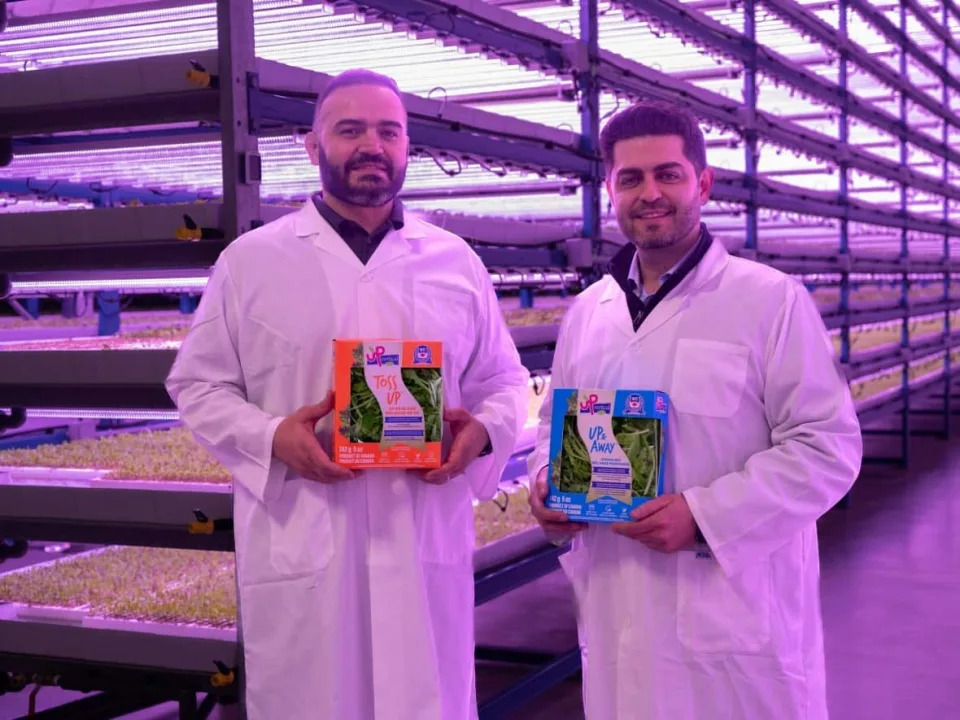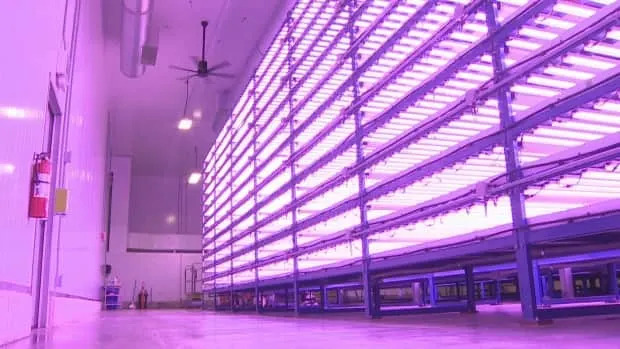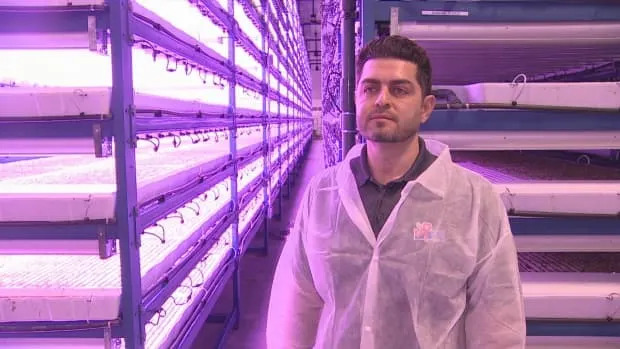CBC
Tue, April 4, 2023

Shahram and Bahram Rashti, co-founders of UP Vertical Farms.
(UP Vertical Farms/Oppy - image credit)
A newly launched vertical farming enterprise in Pitt Meadows, B.C., is hoping to ease food security in the province, as it offers locally grown, environmentally sustainable produce.
The operation, called UP Vertical Farms, is growing baby leafy greens vertically — on shelves stacked atop one another, on a piece of land a fraction of the size needed for traditional farming. According to a news release, the company says it could produce 6.3 million bags of greens per year, which would be sold in grocery stores throughout Western Canada.
"As most people have noticed, our lettuce supply from California's been really hit and miss," said Lenore Newman, the director of the Food and Agriculture Institute at the University of the Fraser Valley.
"It's either been very expensive, or we've had supply chain disruption. We've had poor quality. This idea of producing lettuce locally … the time has come."
Bahram Rashti and his brother Shahram have been working on the project for nearly a decade but are just at a point where they're able to start supplying grocery stores with locally-grown produce.
"We always knew there was an issue with the adverse effects of climate change," Rashti said.
"The more we looked into it, we realized that there's something that we could do to help out, especially for Canada, because a lot of our produce in Canada is imported."
Production 350 times higher
Rashti estimates their production could be up to 350 times higher than that of traditional lettuce farming.
Mark Lefsrud, an associate professor of bioresource engineering at McGill University, says it takes 60 to 90 days to grow leafy greens outdoors on traditional fields. By growing indoors, he said that can be shortened. UP says it takes 13 to 31 days for its products to grow.

Nicholas Allan/CBC
While 350 times greater yield seems ambitious, Lefsrud says it is theoretically possible.
"NASA has been able to show you can get that high," he said. "I haven't seen a commercial company that's pulled it off. Most of the time, we say 30 [times], if you're really good, maybe 60 to 80, but 300 times, that's a bit of a stretch."
Lefsrud, who has worked with NASA in the past, says there is "huge potential" for vertical farms. Like Newman, he said the increasing cost of lettuce is cause enough for people to look for new ways to grow leafy greens.
'Hands-free' facility
UP Vertical Farms is one of the first hands-free vertical farming operations in Canada. It is fully automated and uses touchless technology for everything from seeding to harvest.
The greens are grown indoors, without the use of pesticides, herbicides and fungicides, manure or genetic modification.
Because of all these measures, the end product is ready to eat right out of the bag, the company says.
Rashti said the facility uses 99 per cent less agricultural land, 99 per cent less freshwater and 99 per cent less fertilizer than traditional farming practices.
"It's good food for the people and the planet."
A newly launched vertical farming enterprise in Pitt Meadows, B.C., is hoping to ease food security in the province, as it offers locally grown, environmentally sustainable produce.
The operation, called UP Vertical Farms, is growing baby leafy greens vertically — on shelves stacked atop one another, on a piece of land a fraction of the size needed for traditional farming. According to a news release, the company says it could produce 6.3 million bags of greens per year, which would be sold in grocery stores throughout Western Canada.
"As most people have noticed, our lettuce supply from California's been really hit and miss," said Lenore Newman, the director of the Food and Agriculture Institute at the University of the Fraser Valley.
"It's either been very expensive, or we've had supply chain disruption. We've had poor quality. This idea of producing lettuce locally … the time has come."
Bahram Rashti and his brother Shahram have been working on the project for nearly a decade but are just at a point where they're able to start supplying grocery stores with locally-grown produce.
"We always knew there was an issue with the adverse effects of climate change," Rashti said.
"The more we looked into it, we realized that there's something that we could do to help out, especially for Canada, because a lot of our produce in Canada is imported."
Production 350 times higher
Rashti estimates their production could be up to 350 times higher than that of traditional lettuce farming.
Mark Lefsrud, an associate professor of bioresource engineering at McGill University, says it takes 60 to 90 days to grow leafy greens outdoors on traditional fields. By growing indoors, he said that can be shortened. UP says it takes 13 to 31 days for its products to grow.

Nicholas Allan/CBC
While 350 times greater yield seems ambitious, Lefsrud says it is theoretically possible.
"NASA has been able to show you can get that high," he said. "I haven't seen a commercial company that's pulled it off. Most of the time, we say 30 [times], if you're really good, maybe 60 to 80, but 300 times, that's a bit of a stretch."
Lefsrud, who has worked with NASA in the past, says there is "huge potential" for vertical farms. Like Newman, he said the increasing cost of lettuce is cause enough for people to look for new ways to grow leafy greens.
'Hands-free' facility
UP Vertical Farms is one of the first hands-free vertical farming operations in Canada. It is fully automated and uses touchless technology for everything from seeding to harvest.
The greens are grown indoors, without the use of pesticides, herbicides and fungicides, manure or genetic modification.
Because of all these measures, the end product is ready to eat right out of the bag, the company says.
Rashti said the facility uses 99 per cent less agricultural land, 99 per cent less freshwater and 99 per cent less fertilizer than traditional farming practices.
"It's good food for the people and the planet."

Nicholas Allan/CBC
Newman said that with innovative businesses like this, the quality of produce in B.C. grocery stores will go up.
"[With vertical farming], we're getting product the same day as picked or a day later, whereas when it's coming from California, it's eight or 10 days old before it even lands in our shopping cart."
"Be ready for much better leafy greens than we've ever been used to. And that's a good thing because maybe we can all eat a little more salad."
No comments:
Post a Comment